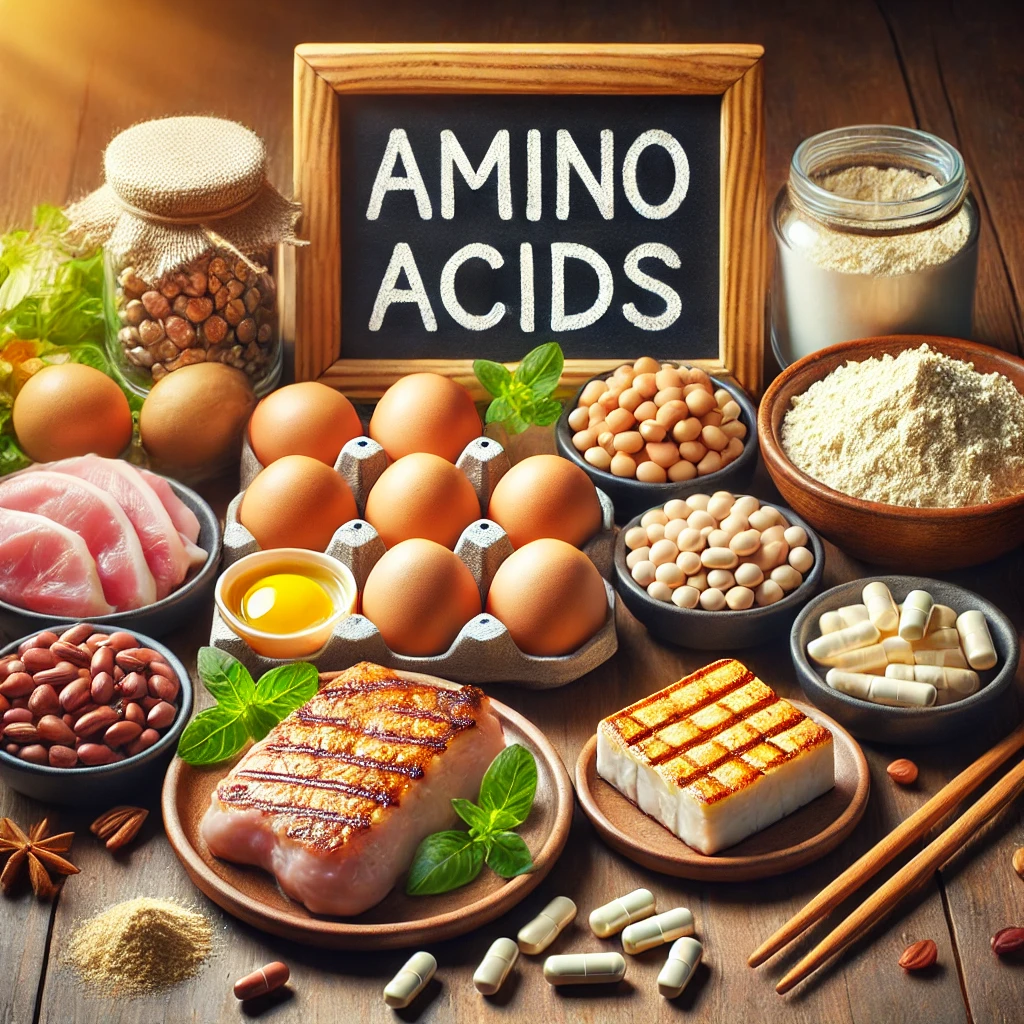Amino Acids: The Vital Building Blocks for Health and Athletic Performance

Introduction – The Essence of Amino Acids
Amino acids are essential molecules that form proteins, the fundamental building blocks of the human body. Without them, we couldn’t build muscle, produce hormones, or keep our immune system functioning properly.
In this guide, we’ll cover what amino acids are, their types, benefits, best dietary sources, and how amino acid supplements can boost athletic performance and overall health.
What Are Amino Acids?
Amino acids are organic compounds made of carbon, hydrogen, oxygen, and nitrogen. The human body uses 20 amino acids to build proteins.
These are divided into three main categories:
-
Essential amino acids (EAA) – Cannot be produced by the body; must come from food.
-
Non-essential amino acids – Produced naturally by the body.
-
Conditionally essential amino acids – Normally non-essential, but required in greater amounts during illness, injury, or high physical stress.
The 9 Essential Amino Acids and Their Key Roles
1. Leucine
-
Function: Stimulates muscle protein synthesis and helps regulate blood sugar levels.
-
Benefit: Enhances recovery and reduces exercise-induced muscle damage.
-
Source: Common in BCAA supplements.
2. Isoleucine
-
Function: Supports energy production and muscle repair.
-
Benefit: Improves endurance and workout performance.
-
Source: Found in BCAA formulas.
3. Valine
-
Function: Aids muscle metabolism and tissue repair.
-
Benefit: Maintains energy during intense training.
-
Source: Present in most complete protein foods.
4. Lysine
-
Function: Supports calcium absorption, collagen, and elastin production.
-
Benefit: Promotes bone health and injury recovery.
-
Source: Meat, dairy, eggs.
5. Methionine
-
Function: Antioxidant; supports liver detox and synthesis of other amino acids.
-
Benefit: Protects liver function and overall cellular health.
-
Source: Meat, fish, sesame seeds.
6. Phenylalanine
-
Function: Precursor to dopamine, norepinephrine, and epinephrine.
-
Benefit: Supports mood and stress management.
-
Source: Meat, fish, eggs, dairy.
7. Threonine
-
Function: Helps form collagen and elastin; supports immune function.
-
Benefit: Maintains healthy skin and connective tissues.
-
Source: Fish, dairy, leafy greens.
8. Tryptophan
-
Function: Precursor to serotonin, which regulates mood and sleep.
-
Benefit: Promotes restful sleep and emotional balance.
-
Source: Turkey, eggs, pumpkin seeds.
9. Histidine
-
Function: Produces histamine for immune and digestive health.
-
Benefit: Aids tissue repair and immune defense.
-
Source: Meat, fish, dairy.
Top Health Benefits of Amino Acids
1. Muscle Growth & Recovery
BCAAs (Leucine, Isoleucine, Valine) boost muscle protein synthesis, prevent muscle breakdown, and accelerate post-workout recovery.
2. Mental Health & Mood Support
Tryptophan and phenylalanine help produce neurotransmitters, improving mood, reducing stress, and supporting cognitive health.
3. Immune System Support
Threonine and histidine are essential for antibody production, strengthening your body’s defense against infections.
4. Energy & Metabolism
Amino acids help convert food into energy, especially during high-intensity training or calorie restriction.
5. Antioxidant Protection
Methionine and cysteine boost glutathione production, one of the body’s most powerful antioxidants.
Best Food Sources of Amino Acids
-
Animal-based (complete proteins): Meat, poultry, fish, eggs, dairy.
-
Plant-based: Soy, quinoa, legumes, nuts, seeds (combine sources for a complete profile).
-
Vegan pairings: Rice + beans, hummus + whole-grain bread, peanut butter + whole-wheat toast.
Amino Acid Supplementation: When and Why to Use
BCAA (Branched-Chain Amino Acids)
Best for athletes to reduce muscle breakdown and improve recovery.
EAA (Essential Amino Acids)
Contains all 9 essential amino acids—ideal for overall protein synthesis and recovery.
Glutamine
Supports muscle recovery, immune health, and gut function.
Arginine (Nitric Oxide Booster)
Improves blood flow and endurance.
Glycine & Collagen
Promotes joint, skin, and bone health.
Latest Trends in Amino Acid Supplements
-
Liquid amino acids – Faster absorption for quick recovery.
-
Fermented amino acids – Plant-based and highly pure.
-
Nutrient combinations – Aminos with B-vitamins, magnesium, zinc for enhanced benefits.
-
Custom amino blends – Powder forms for personalized dosing.
-
Time-release capsules – Steady supply throughout the day.
Key Takeaways & Recommendations
-
Eat a varied diet rich in complete proteins (animal or well-planned plant sources).
-
Consider supplementation if you train intensely, have high stress, or follow a restrictive diet.
-
Vegans and vegetarians may benefit from fermented, plant-based EAAs.
-
Supplementation should be personalized—more is not always better.
Amino acids are not just for athletes—they’re vital for everyone. From muscle repair to immune defense and mental well-being, these building blocks of life deserve a consistent place in your diet.








